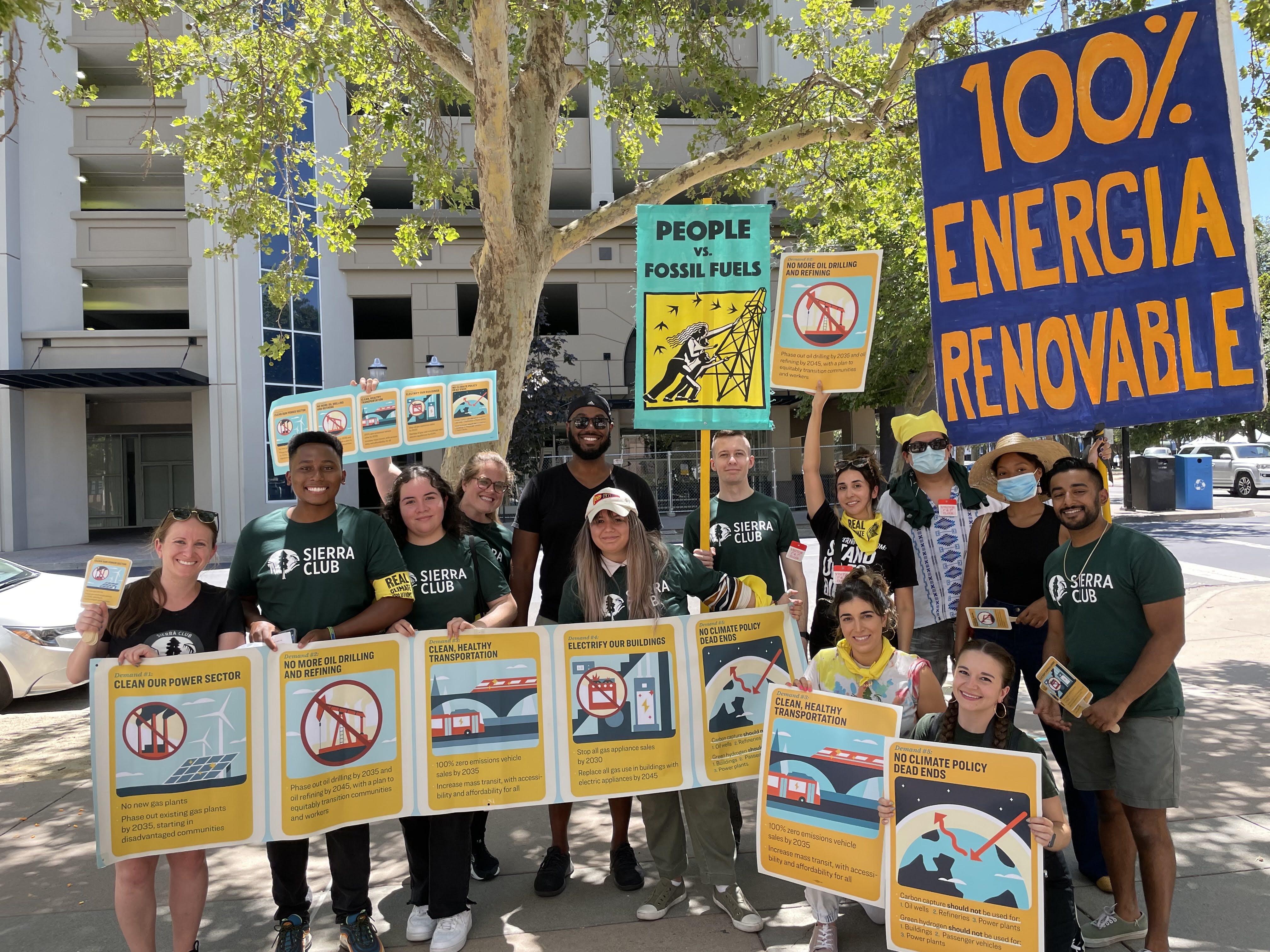
Introducing Our Newest Senior Policy Advocate, Sakereh Carter!
Sierra Club California and Its Allies Show Out in Force at the CARB Board Meeting
A Reminder About Sierra Club California’s Wellness Week (7/11-15)

As some of you may have already noticed, Sierra Club California has hired a new Senior Policy Advocate, Sakereh Carter. Sakereh comes to the Sierra Club from the California State Water Resources Control Board, where she served as an Environmental Scientist. You can view her full bio on our website.
Sakereh has already been working hard digging in on oil/gas, building electrification, and waste management issues, among others. We wanted to give our members an opportunity to learn more about her work and personality through a brief Q&A. Stay on the lookout for articles and communications from Sakereh in the Capitol Voice and other channels in the coming months.
What was the most interesting thing you learned working at the State Water Resources Control Board?
Sakereh: The pervasiveness of plastic, and the impact plastic pollution has on aquatic life, public health, and the environment. I served as the Microplastic Subject Matter Expert (SME), and was tasked with scoping and developing microplastic thresholds for CA state surface waters. Macroplastics, such as large grocery bags and other items, progressively deteriorate into microplastics and humans might ingest up to 100,000 microplastic specks daily Fortunately, ICA is poised to set guidelines for microplastics in drinking water I's essential to take a precautionary approach to plastic pollution and join the fight to address the plastic pollution crisis, as global production of plastic is projected to reach 1.1 million tonnes by 2050!
Which aspect of the Senior Policy Advocate role are you most excited about working on?
Sakereh: Legislative and regulatory advocacy. Policy is tied to every facet of our lives, and it's critical to develop scientifically sound, equity-centered, and environmentally friendly policies that protect BIPOC communities and future generations. The operations of the oil and gas industry, for example, disproportionately impact the health of low-income communities of color through extraction, refining, and disposal near their communities. Advocating for environmentally friendly legislation is an opportunity to envision how the world could be, and defend these communities. Principally, truly transformative change takes transformative policy.
What advice would you give to a young environmental activist who’s interested in developing a career in the field?
Sakereh: I’d recommend reading articles, and learning about policies to build your environmental knowledge. You should also get involved in local community-based organizations that resonate with your values and focus on building genuine connections with individuals in the organization to demonstrate that you care about community concerns and environmental activism.Lastly, look for internships, fellowships, workshops, trainings, and other resources that will expose you to current models of environmental advocacy and the appropriate vernacular for community-centric work.
Although credentials and experience are important, a penchant for morally-centered perspectives is critical too. I believe the best activists are authentic, highlight and uplift unconventional ways of thinking, such as indigenous knowledge, and elevate the voices of historically oppressed and underserved communities. I recommend forming guiding truths or tenets for yourself that you can refer back to when you come up against an issue. as I progress in my career, I try to stay true to the following tenets: (a) Everyone deserves to have a good quality of life, (b) Everyone deserves to have access to clean air, water, and soil (c) The environment is something to be cherished not exploited, (d) The environment and every being within the environment is inherently valuable, and (e) One life is not more valuable than another.
What would our members be most surprised to learn about you?
Sakereh: I love raptors! I stop in my tracks whenever I go hiking to watch their majestic wings fly above me. When I was younger, I volunteered at the Effie Year Nature Center (EYNC) in Carmichael, CA. As a volunteer, I cleaned the enclosures of resident species, educated the public on the natural habitat of each species, and took the owls, snakes, and hawks out for fresh air when necessary. I believe this experience sparked my interest in preserving the environment, which is why early exposure to nature's beauty is critical for building the next generation of environmental advocates. So, if you're in town, let's go for a walk at EYNC!

In June, the California Air Resources Board (CARB) had its first opportunity to publicly hear the Draft 2022 Scoping Plan. The Scoping Plan, set to be adopted by the end of the year, is supposed to chart California’s course to its necessarily ambitious climate goals. The Draft Plan is far too weak and Sierra Club California joined over 100 groups in a letter asking that the Final Plan be strengthened significantly. We also collected and sent to CARB nearly 3,000 comments from members and supporters like you telling them that the plan fails to meet this critical moment.
During the June 23 hearing, CARB board members heard comments from hundreds of members of the public. Amongst other things, the commenters asked CARB to: prioritize direct emission reductions as soon as possible; decarbonize our transportation system and infrastructure; avoid relying on solutions such as biofuels, and unproven Carbon Capture and Removal technology.
Outside of the meeting, Sierra Club staff, volunteers, and supporters held a rally with members of the diverse coalition criticizing the plan. Organizations from across the state, including California Environmental Justice Alliance (CEJA), Physicians for Social Responsibility Los Angeles (PSR-LA), and Asian Pacific Environmental Network (APEN) showed out in force to stand up for the future of our climate.
The rally included speeches from concerned environmentalists and indigenous leaders, a group mural painting, and a sit-in at the board meeting itself. Activists held up signs and organized chants that highlighted the coalition’s demands for an equitable scoping plan that would properly address the concerns of frontline communities.
The following morning, board members had the opportunity to discuss the Draft Scoping Plan. Many board members shared our concerns that the Draft was not ambitious enough. Public conversation will continue in September at a joint meeting between CARB and the Environmental Justice Advisory Committee.
In the meantime, watch your inbox for opportunities to push CARB for a climate plan that meets this moment and centers frontline communities.
A Reminder About Sierra Club California's Wellness Week (7/11-15)
By Michael Blenner

As we mentioned in last month’s Capitol Voice, Sierra Club California will be closed July 11-15 to give our staff an opportunity to relax and recharge. We wanted to send a reminder that we’ll be out of the office. We will not be sending out any alerts (outside of an already scheduled fundraising email), and will not be as responsive to communications.
After a busy June, filled with activism and organizing, we hope you too can take some time off and enjoy the Summer weather in your part of the state.
Follow Us:
  |
Thank you for being a part of our work! Consider making a monthly donation. You may securely donate online or by sending a check to Sierra Club California at 909 12th Street, Suite 202, Sacramento, CA 95814.
